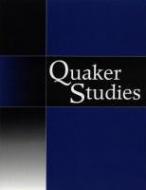
Abstract
Arguing that Quakers have been used as influential stock characters in American performance culture, this essay profiles several examples of Quakers as represented in American theater and film: John Murdock's play The Triumphs of Love (1795), Harry F. Millarde's lost silent film The Quack Quakers (1916), and the Academy Award winning film High Noon (1952). Paradoxically, in each of these productions, which range from farce to serious drama, Friends are shown as either claiming or as striving for unattainable moral and religious human ideals, but also as an exemplary community of individuals against which other Americans might and should be measured.
Recommended Citation
Ryan, James Emmett
(2010)
"Staging Quakerism in American Theatre and Film,"
Quaker Studies: Vol. 14:
Iss.
1, Article 3.
Available at:
https://digitalcommons.georgefox.edu/quakerstudies/vol14/iss1/3
Included in
Christian Denominations and Sects Commons, Film and Media Studies Commons, History of Christianity Commons, Theatre History Commons

New Location Notice
The QSRA now publishes current issues through Liverpool University Press, available to subscribers only, at this location: http://online.liverpooluniversitypress.co.uk/loi/quaker.